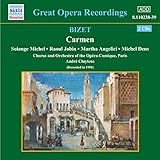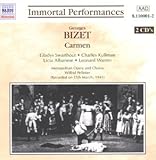Wonderful Carmen at De Vlaamse Opera (and indeed, Calixto Bieito was the nominal director)

Carmen: Nora Gubisch and Brandon Jovanovich
Photo © Annemie Augustijns
The sigh of relief was almost audible during the short love duet after "La fleur que tu m'avais jetée". Carmen started to strip down, fumbled a little bit with José's pants and both started their love making. So after all, Bieito's signature tune was being played. In reality apart from the many lewd gestures, both singers remained firmly and fully clothed. The only full nude was a male dancer during the prelude to the third act and even he was lighted in clair-obscur. Another Bieito-feature, horrible violence, was also somewhat muted. Granted, José gutted Carmen in the finale of the opera in plain sight and in the well-known way Islamists treat those poor people they can lay their hands on and therefore it was a bloody affair but still everybody knows "this is theatre". No, the literally blood-chilling moment came during the third act when the smugglers arrived with six used Mercedes-cars ( For a moment I thought they were smuggling Mercedes'). Enter Escamillo and the fight between him and José with tenor and baritone jumping on and off all those cars, meanwhile singing their lines and succeeding without breaking their necks and finishing a promising career (for the tenor anyway; the baritone wouldn't be a great loss). It made for a formidable theatrical effect but still one wonders if artists should take such a horrendous personal risk.
Now some Bieito-exegetes would say that the somewhat muted stress on sex (for Bieito anyway; I don't think Volpe would allow it at the Met) and violence is due to the director's youth and inexperience as this production is a reworking of a production of 4 years ago. Well, maybe it is but it has to be judged on its own merits and not on the director's obsessions a few years later. And the final word is: it works and succeeds in revitalizing this tired old warhorse. Yes, I don't like the opera anymore. I have known it for 50 years, have played it over and over again and the overexposure and the many productions have led to boredom which can only be redeemed by a fine theatrical experience or formidable music-making and preferably both. The last Carmen I fondly remember was a traditional Verona-production with Franco Corelli, Grace Bumbry, Piero Cappuccilli etc. but since those times it was downhill. And then a director and a fine cast prove that there is quite a lot of life left in the horse. Bieito updated it somewhat to modern Sevilla and immediately changed the traditional perspective. Micaela is not the star-struck virgin but someone who has her eyes firmly set on José and by their behaviour they prove that their affair is a long running one. Carmen and co are not some nice country girls in colourful clothes but hard working factory girls in drab uniforms. For Bieito Carmen's gypsy background is just something that maybe explains a little bit of temperament but traditional gypsies don't work in a factory and therefore Carmen is far more a working class girl in poor surroundings in an individualistic society. This lady reminded me far more of some of those harsh assertive hard working-class New York girls than of romantic Spain of the 19th century where there weren't many Carmens to be found. This Carmen is a fully self-centred woman, wanting her pleasures and wanting them now and definitely not above provoking José: in short nearer to Merimée's Carmen and to Bizet's as well than Carmen as a victim or the somewhat aristocratic Carmen of Béatrice Uria-Monzon who monopolizes the role in France. In this action packed thriller the greatest compliment came from my wife whom I had not warned beforehand. "It looks like a good movie" she said and that was exactly what De Vlaamse Opera had in mind with the production. Still, there are a few things Bieito should take care off. Action and movement is fine but a few moments (like in the terrible last act) of quiet, of immobility may make a deeper impression than the permanent running hither and thither. And one grows somewhat tired with the constant sexual gestures: less can sometimes be more.
Bieito was more than helped by a wonderful cast. French mezzo Nora Gubisch was a revelation. Apart from perfect pronunciation, she brings with her a big booming and finely coloured voice; somewhat better in the low than in the higher regions where the top starts to thin out. Her Mediterranean looks (short, a little bit plump, hawkish nose) are more typical for most Andalusian women than the classical North-European beauty. She was a wonderful performer who radiated strength and determination.
Brendan Jovanovich was the José who delivers good looks, an ability to smoke a lot of cigarettes without bad results for his singing and the athletic features I have already mentioned. And then there is the voice: not a sound every one likes at first hearing, not a thing of traditional beauty and maybe better not heard in the great Italian roles; too little morbidezza. But the voice is smooth, big and in a small house like Antwerp it makes a tremendous impression while it has a gleaming edge of steel in it. In short this is what the French call "un vrai demi-caractère", the French equivalent of the Italian lirico-spinto and if Mr. Jovanovich continues to sing as impressive he should be the rare bird: a real successor in the great line of Franz, Granal, Vezzani, Poncet. Even now I think he is superior to Ben Heppner. And mind you he knows the difference between strength and just shouting: his high B in La fleur was a beautiful pianissimo.
The Latvian soprano Rosita Kekyte is chosen for "le fysique du role" one is tempted to think: a youthful blonde beauty and then she opens her mouth and out comes a fine Italianate lirico. She is now at the Karlsruhe Opera but with her assets she should go far in the French and Italian repertory.
The (little) fly in the ointment was Polish baritone Wojtek Drabowicz: a throaty baritone with a weak top and a badly focused sound. The Antwerp people often try to prove that they are not provincial but cosmopolitan but I cannot believe there is no young baritone in the country who cannot sing better this short role and gain some valuable experience as well. Xenia Konsek and Corinne Romijn (Frasquita and Mercédès) are well-known and beloved comprimarie who as always combine fine acting and fine singing.
Music director Ivan Törzs started out somewhat tentatively but soon got his hands on the score, helped by the very good orchestra and there never was a single hiatus in relationship between pit and singers (On principle I never attend the premiere but always prefer a fourth or fifth performance and every artist I know says that a production always improves after a few evenings). A special word should go to the chorus which sang and acted its heart out. In the last act they just faced the auditorium, pretending they were watching the procession of picadors, toreadors etc and they did it so lustily and convincingly that they earned a well-deserved ovation.
Jan Neckers
[Note: For additional production details, click here.]
Suggested recordings:
Karajan, Price, Corelli, Freni, Merrill

Solti, Troyanos, Domingo, Van Dam, Te Kanawa

Cluytens, Michel, Jobin, Angelici, Dens

Pelletier, Swarthout, Kullman, Albanese, Warren





